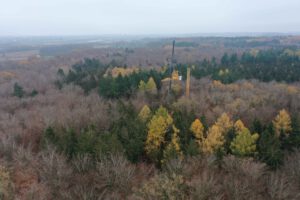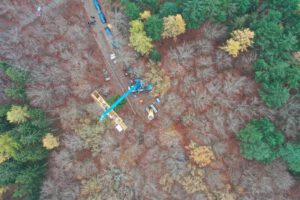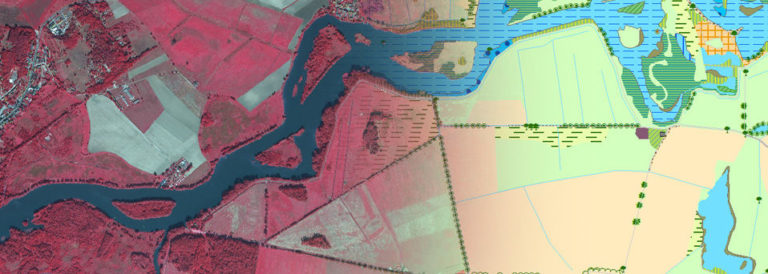As the effects of climate change become visible, the need for information about the vitality of forests increases. Due to the lack of detailed information, the numerous estimates of forest health are contradictory and speculative. Forest remote sensing can help fill this information gap. With the improvements of sensor technology (e.g. hyperspectral) and the cost-effective use of UAVs (Unmanned Aerial Vehicles), the application possibilities of remote sensing methods for assessing the vitality of trees are increasing. At the same time, forest physiology can determine plant constituents with a high indicator value for the assessment of vitality or stress states for a variety of tree species by means of semi-automated laboratory procedures with relatively high sample throughput.
Against this background, the FeMoPhys project (2022 – 2027) aims to bridge the gap between the modern capabilities of forest remote sensing and tree physiology. The project will be conducted at the research site of the GFZ in the Demmin area (Mecklenburg-Vorpommern). A 45-meter-high rotating crane installed in the forest provides unique opportunities for this research approach. The three-dimensional canopy space of an old-growth forest (beech, oak, larch, Douglas fir and spruce) is continuously accessible via the crane and is available for various sampling and measurements in the canopy of many individual trees of these species in different vitality states. Physiological stress markers of the canopy leaves, growth signals from the canopy, trunk and roots, as well as a dense sampling grid with remote sensing sensors (drone, satellite), will be analyzed in collaboration with colleagues from cooperating research institutions. The goal is to gain a better understanding of stress and stress signals in the trees and in the remote sensing data.
More information: https://femophys.lup-umwelt.de/
Project start: September 2022
Duration: 5 years
FKZ: 2220WK80D4
The project is funded by the Forest Climate Fund with funds from the BMEL and the BMUV.
Partners:
- Helmholtz Centre Potsdam GFZ German Research Centre for Geosciences
- Brandenburg State Forestry Agency – Eberswalde Forestry Competence Centre (LFE)
- Technische Universität Berlin – Institute of Landscape Architecture and Environmental Planning: Department of Geoinformation in Environmental Planning
- Landesforst Mecklenburg-Vorpommern Institute under Public Law – Forest Planning, Experimentation, Forest Information Systems
- University of Greifswald – Faculty of Mathematics and Natural Sciences – Biology – Institute of Botany and Landscape Ecology – Landscape Ecology and Ecosystem Dynamics



